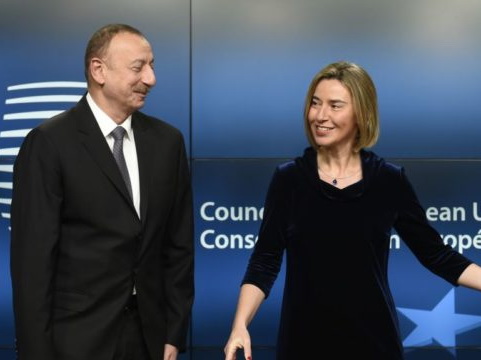Strategic Partnership Agreement: A New Chapter in EU-Azerbaijan Relations -The Jamestown Foundation

Publication: Eurasia Daily Monitor Volume: 14 Issue: 84
By: Ilgar Gurbanov
On June 13–14, the European Union and Azerbaijan held another round of talks on the Strategic Partnership Agreement (SPA). Those ongoing discussions were first inaugurated on February 6, with the official visit of Azerbaijani President Ilham Aliyev to Brussels. Azerbaijan’s Ministry of Foreign Affairs (MFA) stated that both sides hope to finalize the draft agreement by the Eastern Partnership (EaP) Summit to be held in November in Brussels. Yet, numerous pending technical and political challenges first need to be addressed by both sides (Commonspace.eu, June 8, 15).
In 2015, Azerbaijan presented the EU with a first draft of the SPA—a unique case, in which Brussels actually received a draft document from an EU partner, not the other way around. However, negotiations were postponed due to political tensions between the two parties stemming from a resolution passed by the European Parliament (EP) in 2015 criticizing Azerbaijan’s human rights record (see EDM, November 13, 2015). Although relations have now been reanimated, the EP recently (June 13) passed another resolution of similar scope. However, the language of this new resolution was more carefully crafted in comparison to the one from 2015, and the reaction of Azerbaijan’s authorities this time around was less emotional. The Azerbaijani parliament expressed “regret,” while the MFA criticized the EP resolution’s potential legal effects (Europarl.europa.eu, June 13; Azertag.az, Apa.az, June 16; YouTube, June 19).
Prior to the discussions on the SPA, Azerbaijan was in talks with the EU about signing an Association Agreement (AA). By 2013, however, Baku rejected the AA, due to the government’s desire to secure advanced cooperation with Europe but without having to be subjected to the EU’s political normative agenda. In Azerbaijan’s view, the AA failed to consider the country’s strategic interests: notably, it lacked precise wording concerning the Karabakh conflict and support for Azerbaijan’s territorial integrity, unlike the comparable AA agreements with Georgia, Moldova and Ukraine. The AA promised neither a perspective for EU membership nor a security guarantee, and it was not economically attractive for Azerbaijan due to the country’s non-membership in the World Trade Organization (WTO)—which, indeed, might also hinder more ambitious trade provisions for the SPA. Being an associate partner of the EU would also not have helped diversify Azerbaijan’s exports to Europe in the short or medium term, which currently are overwhelmingly based on energy shipments. According to President Aliyev, Azerbaijan preferred to choose “a more realistic path” by suggesting a separate agreement to build its “policy upon the actual situation instead of unfounded populism” (Abc.az, January 1, 2014; President.az, February 18, 2017; Interfax, March 16).
The SPA, on the other hand, promises to be a comprehensive agreement, covering a range of areas. It is meant to replace Azerbaijan’s current Partnership and Cooperation Agreement (PCA) with the EU, but will be conducted on the foundations of the PCA in three blocks: political and security; trade and investment; and economic, social and humanitarian issues (Azvision.az, January 30; Apa.az, Kaspi.az, February 10). The political essence of the SPA is underscored by two principles. First, it adheres to the “differentiation” principle, highlighted in the European Neighborhood Policy’s 2015 policy review, which called for a flexible approach in terms of considering EU partners’ different interests and ambitions. Second, the SPA will maintain “principled pragmatism,” a notion laid out in the EU’s 2016 Global Strategy (GS), which reduces Brussels’ ambitions on democracy and human rights promotion (Eeas.europa.eu, November 18, 2015; June 2016). Taken together, this implies the EU will stick to a more outward-looking and tailored approach vis-à-vis partner countries in its neighborhood and support their different paths toward potential integration by avoiding conventional “one size fits all” principles.
The Karabakh conflict will be among the priority topics within the SPA, due to Baku’s long-running frustration with the EU’s passive role regarding this issue (Trend, November 16, 2016). Several years ago, the European Parliament demonstrated a clear stance in its resolutions on Azerbaijan’s territorial integrity and on the withdrawal of Armenian military forces from Azerbaijan’s occupied territories (Europarl.europa.eu, April 18, 2012; October 23, 2013), but this position has been gradually weakened. The EU’s diplomatic hedging on the Karabakh conflict was obvious in the ENP’s Action Plans that simultaneously supported Azerbaijan’s territorial integrity while endorsing the “right for self-determination” in the case of Armenia (Eeas.europa.eu, Azerbaijan, Armenia, accessed June 22). Azerbaijan’s additional disillusionment came when the EU passed sanctions on Russia because of its aggression against Ukraine; whereas, Brussels had never sanctioned Armenia for its occupation of Azerbaijani territories. The lack of clear support for Azerbaijan in this regard and the EU’s overwhelming focus on human rights pushed Aliyev to skip the Riga EaP Summit in 2015. The Riga Summit’s declaration even lacked clear terminology on the Karabakh conflict, which increased Baku’s disappointment (see EDM, June 4, 2015).
Azerbaijan expects a clear unified approach from the EU with respect to the resolution of the Karabakh conflict in accordance with the principles of territorial integrity and sovereignty within its internationally recognized borders, as prescribed in the EU’s GS (Azertag.az, April 12). But Brussels’ official approach to the Karabakh conflict remains wedded to traditional rhetoric on supporting the blurred proposals of the Organization for Security and Cooperation in Europe’s (OSCE) Minsk Group co-chairs (Apa.az, April 26, 2017; December 8, 2016). The challenge lies in finding appropriate terminology for the conflict in the SPA. If the EU again tries to push for a “balanced” approach to the conflict in the new agreement with Azerbaijan—in accordance with the EU’s currently negotiated agreement with Armenia (Commonspace.eu, June 8)—the effectiveness of the EU-Azerbaijan SPA regarding the Karabakh conflict will remain an open question for Baku.
Ilgar Gurbanov is a Baku-based independent analyst on energy security issues.














